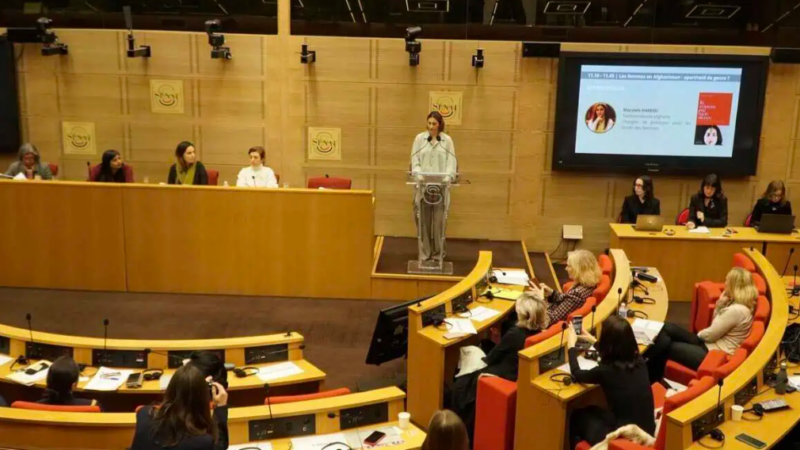Taliban announces victory as US troops backed

Afghanistan’s Taliban is claiming victory in its long war to retake power in Kabul as the US troop withdraws set for September.
Taliban leader Haji Hekmat told the BBC soon after US President Joe Biden announced this month that he would bring home all American troops in Afghanistan by September 11 that “we have won the war and America has lost.”
The hardline leader made it clear what a Taliban victory would look like for those who favor the country’s current secular, democratic system. “We want an Islamic government ruled by the sharia. We will continue our jihad until they accept our demands,” Hekmat said.
The Taliban’s declaration of victory means it no longer views itself as a mere rebel outfit fighting for a fundamental shift in Afghanistan’s existing US-backed system of government led by President Ashraf Ghani.
Rather, the Taliban now clearly sees itself as a government-in-waiting with hard-line plans to replace what it sees as a “rotten” and “un-Islamic” system of governance imported from the West and with an Islamic emirate.
The Taliban’s recently released governance manifesto openly rejects democracy and calls for an “Islamic system [that] has been described and its principles stated and compiled in the Koran, Ahadeeth and in Islamic jurisprudence.”
“We want an Islamic system where our territorial integrity is secured and where our country is purified from foreign forces and their ideologies, as well as any trace of Western legal systems. We desire an Islamic system that protects our religious values, national interests, culture and traditions,” the manifesto states.
“We do not want a system in which the leader adorns invading American generals with flower garlands…All ethnicities and groups correctly identify their rights and interests as secure in an Islamic system. It is indeed only an Islamic system that can guarantee a prosperous and stable Afghanistan.”
That all runs counter to Ghani’s proposal that the country’s stalemate and war be resolved via new elections. In its latest shot across the bow, the Taliban rejected Ghani’s offer of a ceasefire during Ramadan, a month in which hardcore Islamists believe the “virtues” of jihad rise.
While the Taliban were always known for advocating Sharia rule, their new manifesto has dispensed with any uncertainty that may have existed concerning the Islamist group’s supposedly “new” and more “moderate” approach and outlook.
The manifesto has already put the nation’s democratic forces on fearful notice. Concerns are rising in particular for Afghan women who have come out of the shadows of previous restrictive Taliban rule to play prominent roles in Afghanistan’s nascent democratic society.
The bigger question, however, concerns what contagion effect the establishment of a Taliban-led Islamic state would have on other Islamist militant groups operating both in Afghanistan and Muslim majority neighboring countries.
That’s an especially crucial question for next-door Pakistan, which shares a remote and mountainous border with Afghanistan where various Islamic militant groups continue to operate.
That militant group threat exploded into sharp relief with this month’s violent protests launched by the Islamist Tehreek-e-Labbaik Pakistan (TLP) across various Pakistani cities.
The now-banned group staged its uprising over Prime Minister Imran Khan’s failure to uphold an earlier agreement to expel the French ambassador in Islamabad over the publication of controversial Prophet Mohammad portrayals in France.
TLP is not the only radical group waiting in the wings to sow instability. On April 22, the Pakistan-based Taliban group Tehreek-i-Taliban Pakistan (TTP) launched a suicide attack in Quetta, giving the lie to the Pakistan government’s earlier claims that it had completely defeated the militant group.
While isolated attacks claimed by the TTP in Quetta and in North Waziristan are not uncommon, the April 22 targeting of a high-security location has sparked fears of a resurgence.
The attack also showed that despite Pakistan’s recent relative success against the umbrella group, its ideological infrastructure remains intact and is likely to gain inspiration from the Afghan Taliban’s apparent victory against the US and Kabul.
TTP has been branded a “terror organization” by the US, UK and Canada, in part due to its known links to Islamic State and al-Qaeda.
Similarly, the Eastern Turkistan Islamic Movement, an anti-China movement based in Afghanistan, could also be invigorated to renew its push against Beijing amid rising reports of alleged “genocide” against minority Uighurs in China’s westernmost Xinjiang.
The ETIM is not the only Islamic militant group in Afghanistan that could be revived and emboldened by a Taliban walkover in Kabul. ISIS in Afghanistan, a group that remains a major cause of concern for Russia, China and Iran alike, could revive with the departure of US troops and with the Taliban in power in Kabul.
With al-Qaeda, ISIS, ETIM and other militant groups all still present in Afghanistan, albeit many hidden in remote border areas, the return of the Taliban could turn the nation into a violent stew of competing jihadi groups and ideologies, with many bidding to establish networks beyond Afghanistan to achieve their radical goals and objectives.
Not only would such a militant scenario likely destabilize Afghanistan from within, but it would also create the conditions for the spread of these groups into Afghanistan’s territorial neighbors including China, Pakistan and Iran.
This scenario could cause some of Afghanistan’s neighbors to rethink their current support for the Taliban, a position founded in their overarching desire to see America’s departure from the country and Central Asian region.
But while Russia, China and Iran all seem to believe that the benefits of a Taliban takeover still outweigh the risks of a sustained US military presence, the Taliban’s return poses its own risks that could ultimately be more inimical to their interests than the US-forged status quo.






